The first time I tried my hand at making roasted potatoes, the result was less than spectacular. Everyone remembers their initial culinary adventures; mine was a quest for that golden, crispy-on-the-outside yet fluffy-on-the-inside potato perfection. The lingering question from that fateful day was, “Should I have boiled these potatoes first?”
Yes, boiling potatoes before roasting is a recommended step. Parboiling, or partially boiling, potatoes for about 10 minutes softens them just enough. This allows them to roast more efficiently, achieving a crispy exterior and perfectly tender interior.
In this comprehensive guide, we’ll delve into the art and science of roasting potatoes, exploring the role of boiling in perfecting this beloved dish. Through the lens of an island chef and dad, we’ll uncover techniques, tips, and personal anecdotes to enrich your culinary journey and elevate your potato-roasting game.
- Why Roasting Potatoes is an Art
- The Science Behind Boiling Before Roasting
- The Island Dad’s Tried-and-True Method
- Comparison: To Boil or Not To Boil?
- Skin On vs. Skin Off: The Roasting Debate
- Common Roasting Mistakes and How to Avoid Them
- FAQ: Roasting Potatoes Decoded
- Conclusion: Roast Potatoes, the Heart of Family Dinners
Why Roasting Potatoes is an Art
Roasted potatoes, transcending mere culinary realms, hold a cultural reverence unlike any other dish. In many societies, these golden delights aren’t just a side dish; they’re a testament to celebrations, familial bonds, and cherished traditions. The artistry in roasting lies not just in the technique but in the nuances of each method. Whether parboiled to perfection or seasoned with secret spices, the variations in approach determine if your potato sings a ballad of crispy tenderness or merely whispers a lackluster note. Every technique paints a different stroke, making the canvas of roasting both intricate and fascinating.
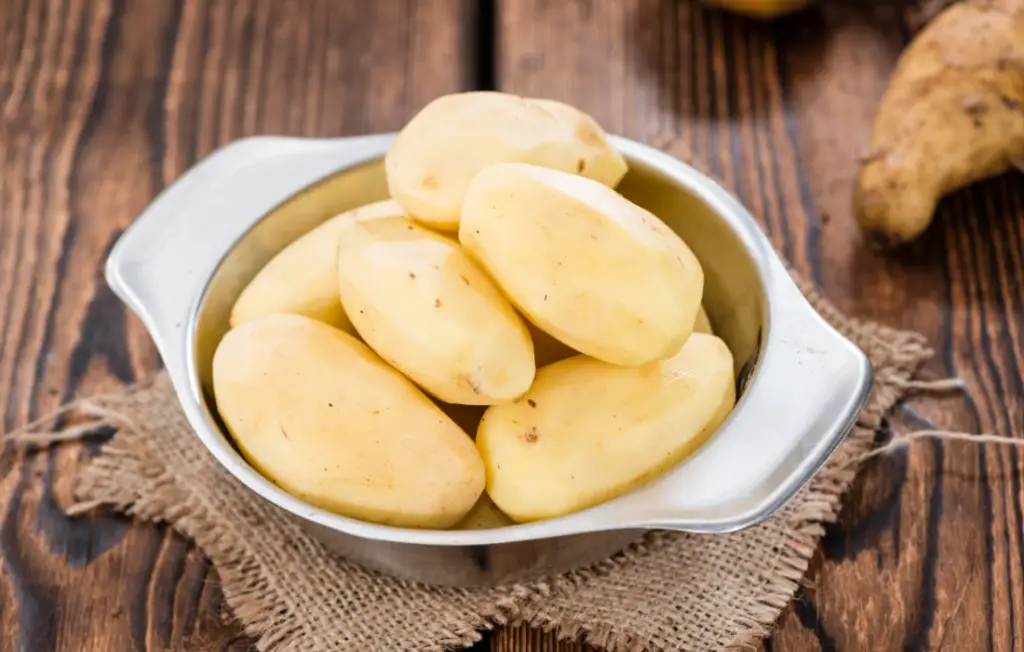
The Science Behind Boiling Before Roasting
A perfect roasted potato isn’t just the product of culinary artistry; it’s also a marvel of food science. At the forefront is the potato’s starch content. This naturally occurring carbohydrate plays a pivotal role in determining the potato’s final texture. When boiled, the starches gelatinize, leading to that desired inner fluffiness while ensuring the outside crisps up in the oven’s heat.
7 Benefits of Parboiling Potatoes:
- Reduces overall cooking time.
- Ensures an even, golden-brown roast.
- Prevents the interior from becoming overly dry.
- Allows for better absorption of flavors and seasonings.
- Reduces the formation of harmful acrylamide during roasting.
- Makes it easier to achieve a crispy exterior.
- Offers a consistent texture throughout the batch.
As for that irresistible crispy skin? It’s a dance of moisture evaporation and oil or fat caramelization at high heat. When parboiled, the potato’s surface becomes roughened, increasing the surface area for this magical crisping reaction to take place. In the realm of potatoes, this process is akin to alchemy, turning an ordinary spud into a golden treasure.
The Island Dad’s Tried-and-True Method
I remember one time, in my early cooking days, where my roasted potatoes resembled rocks more than a delectable side dish! Over the years, with every sun-soaked island celebration and family feast, I’ve tweaked, toasted, and tested. From using grandma’s secret seasonings to the age-old debate of skin-on versus skin-off – it’s been a flavorful adventure to find that impeccable roasting method.
Now, fellow spud lovers, the time has come to share this wisdom. Hold onto your chef hats, because I’ve consolidated all these trials and errors into a foolproof recipe.
Print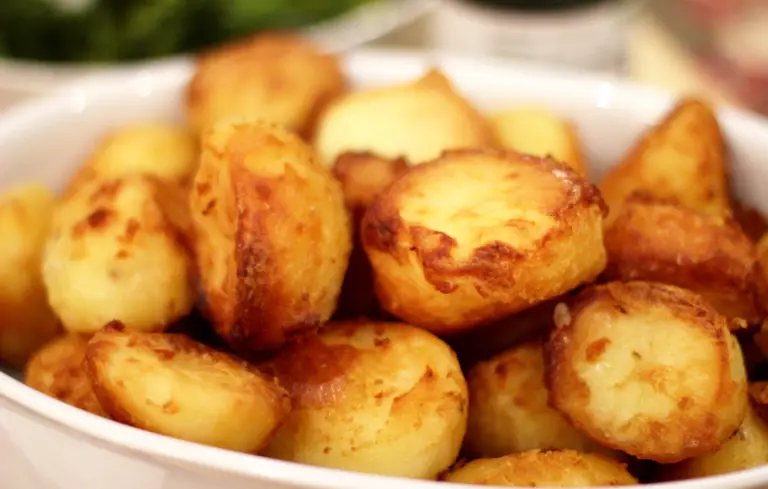
Crispy Parboiled Roasted Potatoes
Unlock the secret to perfectly crispy roasted potatoes with this simple parboiling method. This recipe, inspired by island kitchen wisdom and tried-and-tested dad hacks, ensures every bite is a harmonious blend of crunch and fluffiness.
- Total Time: 40 minutes
- Yield: 4 servings 1x
Ingredients
- 5–6 medium-sized russet potatoes, peeled and quartered
- 4 tbsp olive oil
- 2 tsp sea salt
- 1 tsp freshly ground black pepper
- 2 tsp garlic powder
- 2 tsp rosemary, finely chopped (optional)
Instructions
- Start by placing the peeled and quartered potatoes in a large pot of cold, salted water. Ensure the potatoes are fully submerged.
- Bring the water to a boil and let the potatoes cook for 8-10 minutes. They should be slightly soft but not fully cooked.
- Drain the potatoes and shake them in the colander. This roughens up the edges, which will help achieve that crispy exterior.
- Preheat your oven to 425°F (220°C).
- In a large bowl, mix olive oil, salt, black pepper, garlic powder, and rosemary. Toss the parboiled potatoes in this mixture, ensuring they’re well coated.
- Spread the potatoes on a baking sheet in a single layer.
- Roast in the oven for 20-25 minutes, flipping them halfway through, until they’re golden brown and crispy.
- Remove from oven and let them rest for 5 minutes before serving.
Notes
For a zestier variation, consider adding a sprinkle of paprika or grated parmesan in the final 10 minutes of roasting.
- Prep Time: 15 minutes
- Cook Time: 25 minutes
- Category: Side Dish
- Method: Parboiling /Roasting
- Cuisine: International
Comparison: To Boil or Not To Boil?
The question has been as perennial as the tides: to boil or not to boil? It’s a choice that can make or break your dish, and to give you the most comprehensive answer, we’ve stacked the evidence side by side.
Table: Pros and Cons of Roasting Potatoes Without Boiling
| Pros | Cons |
|---|---|
| Faster preparation time | Inconsistent texture |
| Enhanced potato flavor | Longer cooking time in the oven |
| Less kitchen equipment required | Risk of dry, unappetizing interior |
| Simpler process | Difficult to achieve uniform crispiness |
| No worry about over-boiling | Higher chances of uneven browning |
Differences in Texture: Boiling before roasting leads to an almost universally consistent texture—fluffy on the inside and crispy on the outside. Skipping the boiling step often results in a less predictable outcome, where some parts might be overcooked and others undercooked.
Differences in Flavor: Boiling potatoes can make them more receptive to seasoning, which enriches the final taste. Conversely, roasting without boiling may preserve a stronger, earthier potato flavor but might miss out on the complexity that additional seasoning can bring.
Differences in Cooking Time: Boiling first significantly reduces the time needed in the oven, making it a more efficient method for those pressed for time. However, if you opt to roast without boiling, be prepared for a longer cooking duration, keeping a vigilant eye to avoid overcooking.
In the end, your choice may boil down to your specific needs and tastes. Yet, understanding these variances will empower you to make an informed decision in your culinary pursuits.
Skin On vs. Skin Off: The Roasting Debate
Ah, the age-old debate: to peel or not to peel when roasting potatoes? Both methods have their staunch advocates, and for good reasons. Let’s dive into this potato conundrum from the perspective of our Island Chef and Dad.
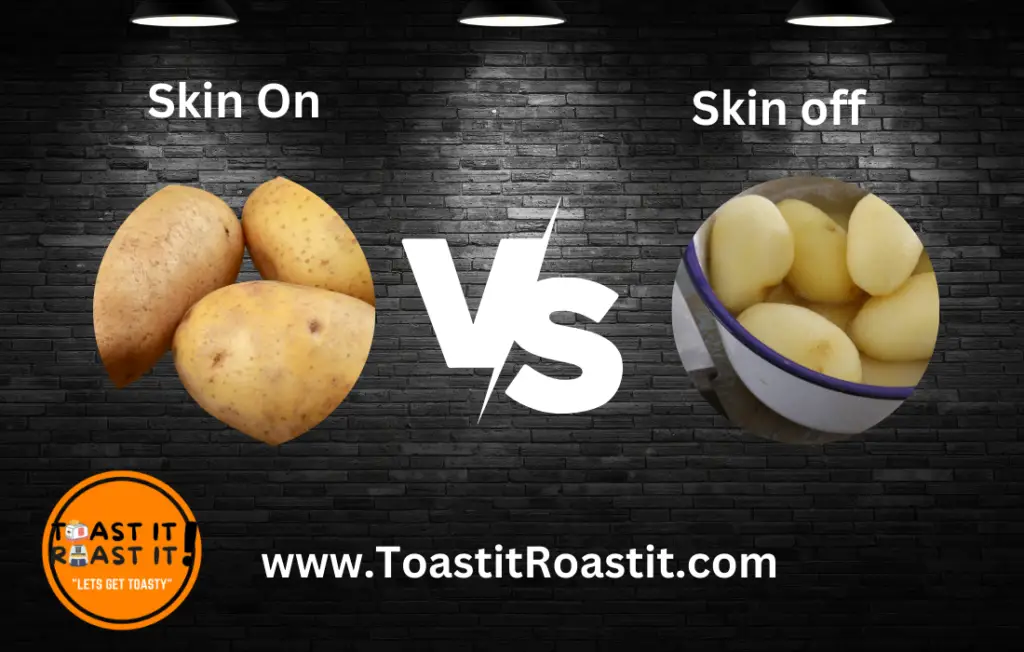
Skin On: The Rustic Charm
- Texture & Taste: Roasting potatoes with their skin gives them a delightful crispy exterior, adding an extra layer of texture. The skin also holds certain earthy flavors that can enhance the overall taste.
- Nutrition: Potato skins are rich in fiber, vitamins, and minerals. By keeping the skin on, you retain more of the potato’s nutritional benefits.
- Ease & Efficiency: It saves time! No need to peel; just give them a good wash, chop, and they’re ready to go.
- Appearance: The rustic, golden-brown appearance of roasted skin-on potatoes can be visually appealing, adding an authentic touch to your dish.
Skin Off: The Silky Smooth
- Uniformity & Texture: Without the skin, you achieve a more uniform texture throughout. If you’re after a silky, smooth roasted potato experience, skin-off is the way to go.
- Flavor Absorption: Peeled potatoes might absorb seasonings and marinades more effectively, leading to a deeper flavor penetration.
- Aesthetics: Skinless roasted potatoes can look more polished or “gourmet,” especially when aiming for a fancier presentation.
- Digestibility: Some people find that potato skins can be a bit tough on their stomachs, so they prefer them peeled for better digestibility.
Whether you’re team ‘skin on’ or ‘skin off,’ the beauty of roasting potatoes lies in personal preference. Experiment with both methods, understand what works best for your palette and the dish’s objective, and let the spuds shine! Remember, from a family Sunday roast to a swanky dinner party, there’s room for both styles in the vast world of potato roasting.
Common Roasting Mistakes and How to Avoid Them
We’ve all been there, standing disappointed before a tray of soggy or overly dried potatoes. As with any adventure, there are pitfalls to sidestep. Here’s a handy guide on the ‘what-not-to-dos’ of potato roasting.
Why Potatoes Might Turn Out Soggy or Overly Dry:
Overcrowding is a major culprit. Give those potatoes room to breathe on the tray. If they’re too close, they’ll steam, leading to the dreaded sogginess. On the flip side, too little oil or too long in the oven can leave them parched and dry.
Over-Boiling and Its Effects:
Parboiling is a fine balance. Overdo it, and you’re on the fast track to mashed potatoes. Aim for slightly softened but not fully cooked. They should still hold their shape and have a firm center.
Importance of Patting Potatoes Dry:
Water is the nemesis of crispiness. Once you’ve parboiled, give them a good pat-down with a kitchen towel. Remove excess moisture, and you’re paving the way for a golden, crispy treat.
Navigating the world of potato roasting is both an art and a science. But with these tips in your culinary toolkit, you’re well on your way to achieving roasted potato perfection.
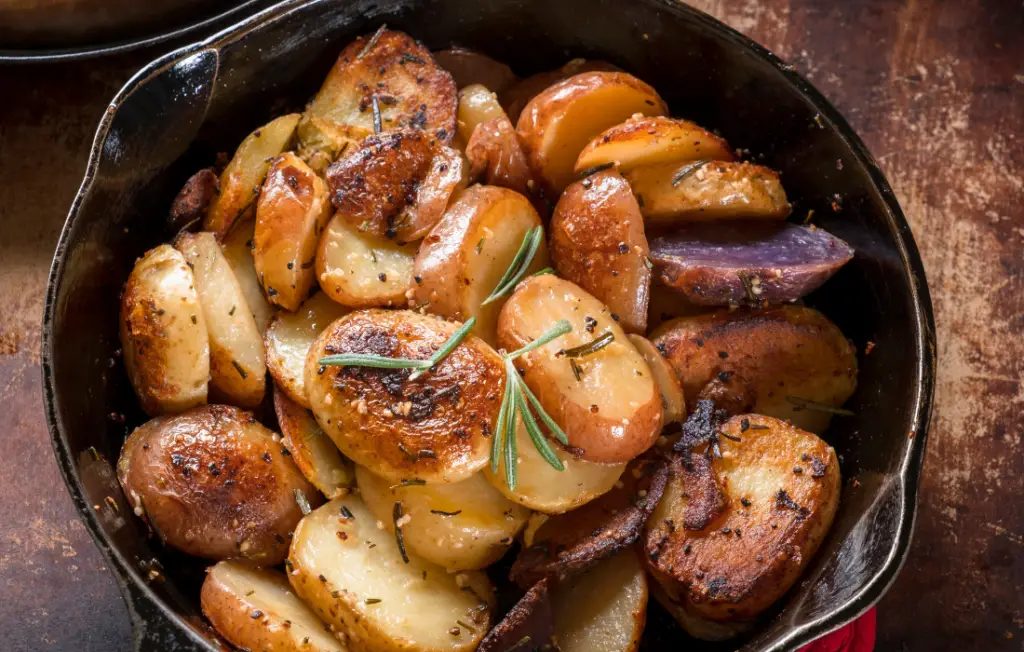
FAQ: Roasting Potatoes Decoded
Why are certain potato varieties better for roasting?
Certain potato varieties have higher starch content, which, when roasted, translates to a fluffy interior and a crisp exterior. Varieties like Russet and Maris Piper have this characteristic and are thus preferred for roasting.
Health benefits of roast potatoes?
Roasted potatoes retain many of the natural nutrients of potatoes, including vitamin C, vitamin B6, and potassium. When cooked in healthy oils like olive oil, they can be a source of good fats. Additionally, the skin, when left on, adds fiber to your diet. However, moderation is key as they can be calorie-dense.
How to roast alongside other vegetables?
Roasting potatoes with other vegetables can be a delightful medley of flavors. To ensure even cooking, choose vegetables with similar cooking times, or cut them into sizes that align with the potato pieces. Popular companions include carrots, bell peppers, and onions. Remember to adjust seasoning to cater to all the veggies.
How long to boil potatoes before roasting?
Typically, boiling potatoes for 8-10 minutes will suffice. The aim is to parboil, not fully cook them. They should be slightly softened but still retain a firm center.
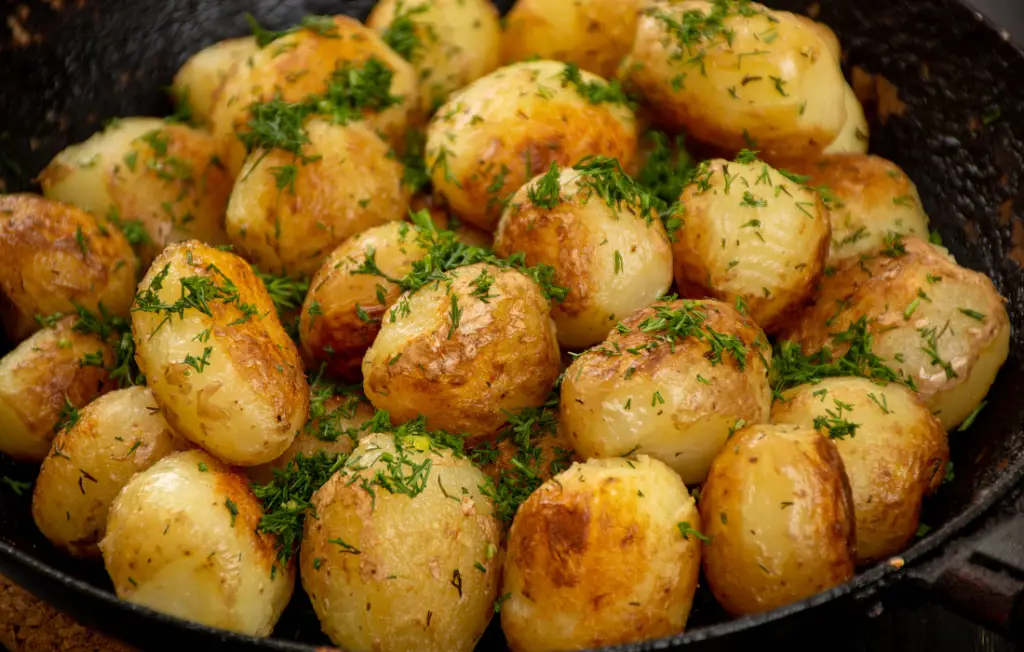
Can you over-boil potatoes?
Absolutely. Over-boiling potatoes will cause them to become too soft or mushy. This can be detrimental for roasting as they may not hold their shape and might not achieve the desired crispiness.
How to store parboiled potatoes?
Once parboiled, let the potatoes cool completely. Then, place them in a single layer on a tray and freeze. Once frozen, transfer them to airtight containers or freezer bags. They can be stored for up to one month. When ready to use, you can roast them directly from the freezer, adjusting cooking time accordingly.
Understanding the intricacies of roasting potatoes can greatly enhance your culinary results. By mastering these FAQs, you’re setting yourself up for roasting success.
Conclusion: Roast Potatoes, the Heart of Family Dinners
Every time I pull a tray of golden, crispy roasted potatoes out of the oven, I’m instantly transported back to my childhood island kitchen, where the aroma of roasted delights signaled love and togetherness. It’s not just about the potatoes; it’s about the memories they hold and the ones they help create.
As a dad, watching my family’s eyes light up and hearing the chorus of “mmm’s” around the dinner table, it reminds me that sometimes, it’s the simplest dishes that hold the most significant value. Whether you’re following this guide to the tee or putting your own twist on it, the journey to finding your perfect roast is one filled with joy, trials, and delicious outcomes.
So, roll up those sleeves, my fellow cooking enthusiasts. Dive into the world of roasting, and let the humble potato be the star that brings your loved ones closer at every meal. Happy roasting!

